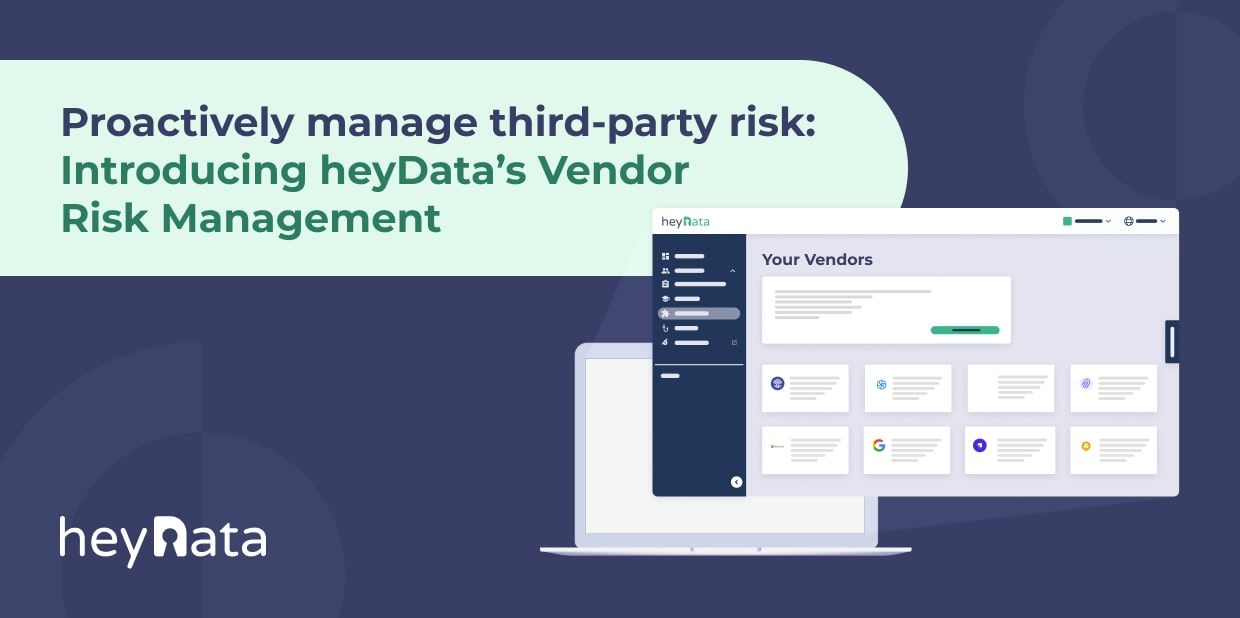
Proactively manage third-party risk: Introducing heyData’s Vendor Risk Management Tool

As businesses increasingly rely on external partners for various services, Vendor Risk Management has become an essential component of data protection and compliance strategy. Recognizing this urgency, heyData is thrilled to introduce our groundbreaking Vendor Risk Management Tool, designed to meet the unique compliance challenges faced by small and medium-sized Businesses (SMBs) and startups.
Table of Contents:
The Imperative of Vendor Risk Management
Data breaches and compliance failures often originate from vendor vulnerabilities, exposing organizations to regulatory scrutiny and reputational harm. Understanding the importance of Vendor Risk Management isn't an option—it's a strategic necessity. heyData's Vendor Risk Management Tool deciphers the complexities of compliance, aligning directly with GDPR Article 28, which mandates due diligence and ongoing oversight for data processors.
Our tool automates these requirements into a streamlined workflow, from initial vendor assessments to real-time compliance alerts, making compliance both proactive and efficient.
What is Vendor Risk Management?
Vendor Risk Management involves identifying, evaluating, and mitigating the risks associated with third-party vendors—entities with whom your business exchanges data, processes, or technology. While the objective is to comply with legal standards like the GDPR, it's also about protecting your business from external vulnerabilities.
In simpler terms, Vendor Risk Management is akin to a vetting process. Just as you'd ensure a babysitter is qualified and reliable before leaving your children with them, Vendor Risk Management evaluates vendors to determine their adherence to data protection laws, cybersecurity standards, and other criteria in line with your business objectives. By integrating this into your operations, you're not just ticking off legal boxes; you're building trust and ensuring the integrity of your business.
Watch this short video to see how heyData's Vendor Risk Management Tool revolutionizes compliance strategy, safeguarding your business from vendor-related risks.
Key Features and Functionalities of heyData Vendor Risk Management
Our Vendor Risk Management Tool comes packed with features that align with our product vision of predictive, effortless, and sustainable compliance:
What the Vendor Profile Tells You
Each vendor profile is a treasure trove of essential information:
- Pending Tasks: Highlighted actions, such as uploading a signed Data Processing Agreement, streamline your compliance efforts.
- Personal Data Involved: Know what types of data the vendor will handle, helping you assess the implications.
- Data Transfer Regulations: Assures you of the vendor’s compliance with GDPR data transfer rules.
- Risk Level: Simplifies your risk assessment process with 'High Risk' or 'Low Risk' categorizations.
- Additional Safeguards: Includes extra measures taken by the vendor to secure your data.
- Vendor's Legal and Contact Information: Essentials for your due diligence process, including data protection contacts and storage locations, are provided for ease of reference.
Distinct Advantages
The heyData Vendor Risk Management Tool offers you the following advantages:
- Efficiency and Scalability: Our tool’s automation capabilities allow you to scale your vendor management operations without overwhelming your resources. It helps you to save time and resources by automating the assessment of your suppliers and data processors.
- Expert-Backed Solutions: Developed by data protection officers and industry experts, our platform provides a best-in-class vendor risk management tool.
- Building Trust: Demonstrate to your customers that you only engage with GDPR-compliant vendors, enhancing their trust in your operations.
You can experience firsthand how our Vendor Risk Management Tool, combined with our All-in-one compliance solution, can elevate your compliance strategies.
Conclusion
There’s never been a more critical time to invest in robust Vendor Risk Management. The heyData Vendor Risk Management Tool not only simplifies compliance but adds a vital layer of security to your data transactions with vendors. It's not just an add-on; it's an integral part of our All-in-One Compliance Solution designed to make data protection and compliance accessible and effective for all businesses.
Contact us today for a complimentary compliance audit and discover the revolutionary impact of heyData’s Vendor Risk Management Tool on your data governance strategy.


